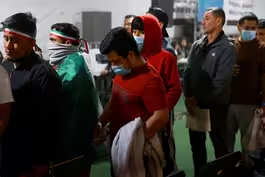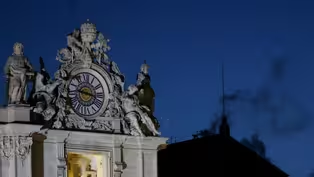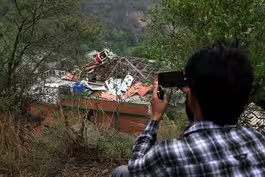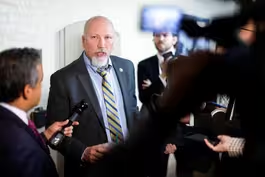
Pakistani ambassador, Indian advisor share views on attacks
Clip: 5/7/2025 | 10m 54sVideo has Closed Captions
Pakistani ambassador, Indian advisor share perspectives on recent attacks and retaliation
Tensions between Pakistan and India are soaring after Indian missile strikes that Pakistan is calling an act of war. Amna Nawaz gets views on the conflict from Pakistan's Ambassador to the U.S. Rizwan Saeed Sheikh and India’s perspective from Vikram Singh, a senior advisor to the U.S.-India Strategic Partnership Forum.
Problems playing video? | Closed Captioning Feedback
Problems playing video? | Closed Captioning Feedback
Major corporate funding for the PBS News Hour is provided by BDO, BNSF, Consumer Cellular, American Cruise Lines, and Raymond James. Funding for the PBS NewsHour Weekend is provided by...

Pakistani ambassador, Indian advisor share views on attacks
Clip: 5/7/2025 | 10m 54sVideo has Closed Captions
Tensions between Pakistan and India are soaring after Indian missile strikes that Pakistan is calling an act of war. Amna Nawaz gets views on the conflict from Pakistan's Ambassador to the U.S. Rizwan Saeed Sheikh and India’s perspective from Vikram Singh, a senior advisor to the U.S.-India Strategic Partnership Forum.
Problems playing video? | Closed Captioning Feedback
How to Watch PBS News Hour
PBS News Hour is available to stream on pbs.org and the free PBS App, available on iPhone, Apple TV, Android TV, Android smartphones, Amazon Fire TV, Amazon Fire Tablet, Roku, Samsung Smart TV, and Vizio.
Providing Support for PBS.org
Learn Moreabout PBS online sponsorshipAMNA NAWAZ: To discuss this further now, we get two views.
First, I'm joined by Pakistan's ambassador to the United States, Rizwan Saeed Sheikh.
Ambassador sheik, welcome to the "News Hour."
Thank you for joining us.
We saw Pakistan's Prime Minister Shehbaz Sharif call those Indian strikes a blatant act of war.
He promised retaliation.
Give us Pakistan's view at this moment.
What could that retaliation look like?
RIZWAN SAEED SHEIKH, Pakistan's Ambassador to the United States: Thank you, Amna, for having me at this show.
As you have mentioned, that the prime minister of Pakistan called it a blatant act of aggression.
That's what exactly it was, because it was conducted without affording any evidence of the incident that took place in the Indian illegally occupied Jammu and Kashmir in Pahalgam.
So it was presumptuous pretext on which this aggression was conducted, without affording evidence and also without accepting Pakistan's well-intended offer of conducting an impartial, neutral inquiry into the incident, investigation to the incident, which was generally welcomed and supported by the international community.
So Pakistan yesterday acted in self-defense.
And we, as you have seen and mentioned, downed five Indian fighter jets, three of them Rafale, SU-30, and then, of course, the MiG 29 as well.
AMNA NAWAZ: And is that -- the downing of those jets, is that the totality of the Pakistani response or will there be more?
RIZWAN SAEED SHEIKH: Well, there was a meeting of the National Security Committee this morning in Islamabad.
It took a full view of the entire situation.
And if you look at the declaration that has come out of it, you would notice that it mentions that Pakistan still reserves the right to respond to the time of its -- and place of its choosing.
So, whatever we did yesterday was in self-defense.
But under Article 51 of the U.N. Charter, Pakistan reserves the right to respond.
We are a peaceful nation.
We do not want the situation to escalate.
But given the bluntness of the act, we will continue to review it very closely and see how do we need to respond in the national interest, in our security interests.
AMNA NAWAZ: And should we take that to mean, Mr.
Ambassador, that there will be additional military response?
And has Pakistan ruled out strikes inside India in response to the Indian attacks that were carried out inside Pakistan?
RIZWAN SAEED SHEIKH: Well, it's a question of determination and strategy, which perhaps cannot and should not be revealed in a public statement or at a public forum.
But as I have mentioned, Pakistan has this right in terms of international law.
We do not want to escalate.
We are a peace-loving nation, but we want peace with dignity.
And that is what we are seeking in this episode or in any other such episode.
But the important question here is that, after Pahalgam, which is after a lapse of almost six years, this incident has taken place.
The international community needs to pay attention to the broader issue of the disputed territory of Jammu and Kashmir, which under the U.N. resolutions has to be resolved peacefully.
It has to be settled peacefully through a U.N.-supervised plebiscite.
And until that larger problem is attended to, incidents like this can happen and blames like this, which India has leveled, can continue to fly around.
So it is important to attend to the major core issue between India and Pakistan, which is Kashmir.
And there is this opportunity to do that right now.
AMNA NAWAZ: Mr Ambassador, if I may, in this moment, setting aside the larger issue of Kashmir, which I know the two nations have fought multiple wars over now, we heard President Trump say that he hopes this ends very quickly.
Is there a role for the U.S. to play right now when it comes to mediating or de-escalating, or is the ball squarely in Pakistan's court now?
RIZWAN SAEED SHEIKH: Well, the United States and the broader international community has previously played a role in similar situations.
The United States being, of course, the preeminent world power, has perhaps a disproportionate responsibility with regard to international peace, security, stability, and its maintenance, particularly in a region which India and Pakistan put together, holds no less than 1.6 billion people.
And the president, of course, himself has mentioned that he wants to leave a legacy of peace.
He wants to liquidate peace to the world at the end of his term.
So, there is no other situation in the world today which is perhaps more impactful in terms of human lives and livelihoods than India-Pakistan situation, and Kashmir being the core issue has to be resolved to that end.
AMNA NAWAZ: That is Pakistan's ambassador to the U.S., Rizwan Saeed Sheikh.
Ambassador Sheikh, thank you for your time.
We appreciate it.
RIZWAN SAEED SHEIKH: Thank you.
AMNA NAWAZ: Well, to understand India's perspective and how it's preparing for Pakistan's potential response, we turned out to Vikram Singh.
He's a senior adviser to the U.S.-India strategic partnership forum and was deputy assistant secretary of defense for South and Southeast Asia under the Obama administration.
Vikram, welcome.
Thanks for being here.
VIKRAM SINGH, Senior Adviser, U.S.-Strategic Partnership Forum: Hey, Amna.
Glad to join you.
AMNA NAWAZ: Just want to get your response to what you heard from the ambassador there, who did not rule another potential military response from Pakistan.
VIKRAM SINGH: Yes, I mean, I think the Pakistanis are definitely considering now whether they sort of call it a day.
We shot down some planes.
We don't know if that's true or not or how many are not yet, but that will emerge.
And maybe that's the easiest off-ramp for Pakistan, the easiest exit.
But India did step things up in this reprisal.
We haven't seen anything like this since 2019.
And in this case, India hit many more targets in many more locations, including one target in Punjab, which is a part of the country that hasn't been a part of an active conflict since the 1971 war.
So, certainly some in Pakistan will be pushing for more reprisal.
AMNA NAWAZ: In terms of how India would view a Pakistani response, what would be seen as de-escalatory versus a potential escalation in these tensions?
VIKRAM SINGH: I think India is trying to re-establish deterrence over terrorist strikes emanating from Pakistan.
The Indian view is quite simply that the attack that happened two weeks ago, which was worse in some ways than prior attacks, because it didn't target the military, it pulled Hindu men away from their families at a tourist site and they were massacred in front of their families.
And the way that's resonating in India has really pushed Indian officials to have a strong response like we have seen.
And I think they would hope to see the Pakistanis call it a day.
I think both sides know that escalation gets more complicated to manage, not less complicated, if you don't take any off-ramps.
So the one indication is if a jet was brought down, one or more, could the Pakistanis use that as an off-ramp and say, look, you can do this stuff, we don't want you to do it, but we can defend ourselves?
AMNA NAWAZ: And we have just now learned that both the Indian and Pakistani national security advisers are speaking to each other.
Do you take that as a positive sign that this will somehow be mediated to a de-escalation between the two nations without a third party intervening?
VIKRAM SINGH: I mean, that should be a positive sign.
And this is going to get -- if this gets -- when this gets resolved, which it probably will, it probably will not escalate uncontrollably, when this gets resolved, it's going to be through that channel, the national security adviser channel.
That's the most important conduit for India and Pakistan to actually communicate over things like this.
But the Indian side is going to be saying, we need you to dismantle these terrorist camps and this infrastructure.
And though the Pakistanis act as if there is no terrorist infrastructure there, it's really widely known that those are actually camps and bases for Jaish-e-Mohammad, Lashkar-e-Taiba, globally designated terrorist organizations, and that the Indians are going after people that are recognized by the U.N. and the United States and even Pakistan itself as terror groups.
AMNA NAWAZ: And we know Jaish-e-Mohammad did claim responsibility for a 2019 attack against Indian troops in Kashmir.
But to this point, as the Pakistanis continue to say, they have seen no evidence, we know Indian officials did show locations that they say were where the terror cells had been training there.
But without anyone claiming responsibility, without additional evidence, should India present that to Pakistan if they have it?
VIKRAM SINGH: I mean, I think India should present whatever it has.
I think the real question tends to be, is the Pakistani state involved or not?
I think the -- when Pakistan denies any connection, I don't think that is really what they mean.
They're basically saying, hey, this is because of grievances in Kashmir and there's angry people and they do these things and it's not our doing.
But I think Pakistan really needs to step up on dismantling terrorist infrastructure inside Pakistan.
That's the way to get India to the table to discuss underlying issues.
AMNA NAWAZ: As you heard the ambassador there reference, Kashmir remains the larger core issue here, still a disputed territory.
Before that terror attack in Indian-administered Kashmir two weeks ago, Prime Minister Modi had said Kashmir was stable and it was safe.
Does the attack show that that is not the case, and what does that mean for the future of that conflict?
VIKRAM SINGH: I think it's a bit of a shock after all of these years.
And also Indian and Pakistan have actually been in a surprisingly durable cease-fire along the line of control since 2021.
And this is something that people really viewed as not very sustainable, but it's shown that they could have it.
But shelling had stepped up.
And I think the Pakistani certainly extremist groups have wanted to make sure that the area is unstable.
And this certainly shocks the Indian system into realizing that they can't just rest on their laurels.
AMNA NAWAZ: We will wait and watch and see what happens next.
Vikram Singh, senior adviser to the U.S.-India Strategic Partnership Forum, thank you so much for being here.
Really appreciate your time.
VIKRAM SINGH: Thank you.
Thank you, Amna.
Examining Trump's latest hardline immigration policies
Video has Closed Captions
Clip: 5/7/2025 | 6m 22s | Examining Trump's latest hardline immigration policies and legal battles around them (6m 22s)
A look at difficult issues the next pope will face
Video has Closed Captions
Clip: 5/7/2025 | 8m 11s | As the conclave begins, a look at difficult issues the next pope will face (8m 11s)
Pakistan calls Indian strikes an act of war, vows to respond
Video has Closed Captions
Clip: 5/7/2025 | 3m 8s | Pakistan calls Indian strikes an 'act of war' and vows to respond (3m 8s)
Rep. Chip Roy: GOP leaders need to 'show us the math'
Video has Closed Captions
Clip: 5/7/2025 | 6m 26s | Rep. Chip Roy says GOP leaders need to 'show us the math' in tax cut, Medicaid talks (6m 26s)
Social network brings people together in divisive times
Video has Closed Captions
Clip: 5/7/2025 | 9m 56s | How a social network is bringing people together in increasingly divisive times (9m 56s)
Providing Support for PBS.org
Learn Moreabout PBS online sponsorship
- News and Public Affairs

FRONTLINE is investigative journalism that questions, explains and changes our world.

- News and Public Affairs

Amanpour and Company features conversations with leaders and decision makers.












Support for PBS provided by:
Major corporate funding for the PBS News Hour is provided by BDO, BNSF, Consumer Cellular, American Cruise Lines, and Raymond James. Funding for the PBS NewsHour Weekend is provided by...





